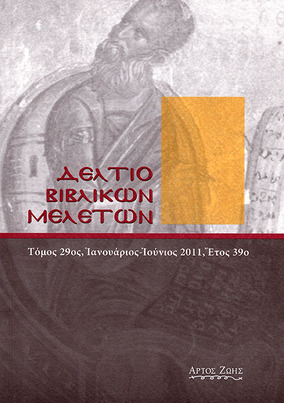Παγκοσμιοποίηση και Παύλεια θεολογία
Part of : Δελτίο βιβλικών μελετών ; Vol.21-22, 2003, pages 131-146
Issue:
Pages:
131-146
Parallel Title:
Globalisation and Pauline theology
Author:
Abstract:
Globalisation is an economical, technological, social and generally political reality. It includes some positive elements because it tends towards a global unification of people, hence in the economical-technological field it works quite positively but at the same time it also includes a lot of negative elements. However, globalization is the imitation of a previous situation experienced by mankind during the Roman period known as the Pax Romana. The Roman authority, the Roman Emperor, dominated and the rest of the world enjoyed the peace, while a certain centre led the economy, the trade and the culture of the nations. Today, the centre of globalization is in the hands of the only super-power on the planet and with the same philosophy of the past the planet-leader, like a global monocrator, is trying to hold the political, military and economic planning and control, through a pan-religious tendency of a directed political planning, which adapts to the new order. Pauline Theology, through its eternal character, meets the challenges of every era and the Pauline words is dynamic to such a degree that it has the ability to restore the alienated person to hisuher correct orientation. At the same time the Pauline mission directs human civilization through an ecumenical perspective. In this way, the proposition of the Apostle of the Gentiles to the challenge of globalization is the universality of love and Christian ethic. This proposition is based on the fact that human nature undergoes the process of decay and death and for this reason Pauline theology is presented as the word of encouragement and consolation to the troubled contemporary man. At the same time Pauline theology clearly declares that the overlord of history is not the finite planet-leader or the Emperor of the past, but God, Himslef, who created the world and leads it to a definite end with the fulfillment of the eschata. The realization of this course of the creation is ensured, because the regeneration declared by the Pauline theology is based on the experience of the Passion, the Cross and the Resurrection of Christ and this is the evidence given by the Apostles and the Church in general.
Subject (LC):
Notes:
Περιέχει σημειώσεις, Τιμητικό αφιέρωμα στον καθηγητή Σάββα Αγουρίδη




